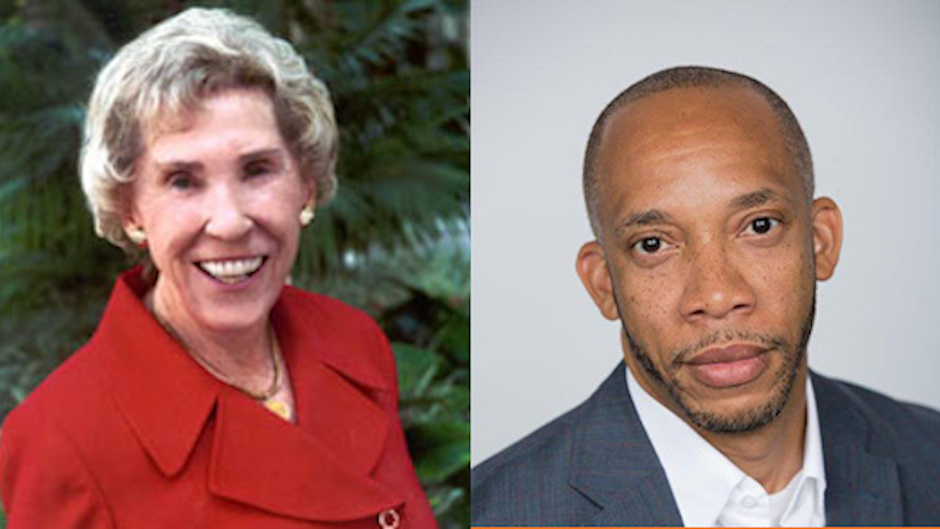On Thursday, January 29, 2015, M. Minnette Massey, Professor of Law Emerita, will formally fulfill a promise she made in 2008 to Charlton Copeland, Professor of Law.
As Massey – former acting dean of Miami Law, half a century on the faculty, early adopter of diversity, and the undisputed queen of civil procedure – exited her final class, she turned to Copeland – still a new professor with only a year under his belt – and delivered the scepter. “It’s up to you now,” she bequeathed.
Copeland will be appointed the inaugural holder of the M. Minnette Massey Chair in Law on the 29th at 4:30 p.m. at the Lowe Art Museum.
Massey first arrived at the University of Miami in 1944 as a freshman, class of 1948. She would graduate from Miami Law in 1951, and join the faculty in 1958, while simultaneously earning an LL.M. as a Kenison Fellow at New York University.
The fair-haired, green-eyed spitfire was one of the “First Wave,” fourteen woman pioneers who elbowed their way into the male-dominated world of American law school professors. Massey began teaching legal research as an assistant law librarian, but rapidly asserted her dominance in the machinations of Florida civil procedure.
She would catch the attention of U.S. Supreme Court Justices Hugo Black and William O. Douglas, who admired her dazzling intellect and skills as a raconteur. Think Shirley MacLaine, only loads smarter. She ascended to assistant dean, then first woman dean, all the while imprinting armies of young lawyers as masters of the intricacies of litigation and the rightful leaders of their profession. She was a force to behold, and used her powers to lead the law school into integration of both the faculty and student body.
When Copeland was born, Massey was already a decade past her midpoint at Miami Law. He would take a long, but far more interesting path to the steps of 1311 Miller Drive.
On his road to becoming a law teacher committed to the ideal of the training of lawyers and scholarly engagement, the young New Orleanian Copeland would weather many New England winters: first at Amherst College, then through both Divinity and Law School at Yale University. From there, he would clerk in South Africa for two justices of the Constitutional Court, then return to clerk at the United States Court of Appeals for the Sixth Circuit. After clerking, he was an associate at Hogan & Hartson in Washington, D.C. Copeland began his academic career as a visiting professor at Northwestern University School of Law.
The Florida sun would finally shine on Copeland in 2007 when he was invited to join the faculty at Miami Law. From the lectern or the pulpit, the charismatic Copeland holds his audiences spellbound, although he suspects that such a feat is easier when students haven’t been introduced to the material through an episode on Law & Order.
Whether teaching civil procedure, administrative law, or federal courts, Copeland’s classes are highly sought after. His goals as a teacher are always to keep his students engaged in the subject matter by demonstrating the commonsense dimension of often arid areas of study. Additionally, he aims to demonstrate the relevance of these subjects to both the practical questions that lawyers face, and the fundamental issues of policy making in a democracy. Copeland considers himself first, and foremost, a teacher of lawyers, who, he expects, will do great things in their respective communities.
Copeland’s passion for teaching is fueled by his scholarly interests. His primary area of research during his time at Miami Law has been an attempt to rethink our conceptualization of the national-state relationship as reflected in state and national institutions. In both his writings on federalism and his more explicit writing on the theological dimensions of law and politics, Copeland has been influenced by his belief that there is something normatively consequential in our being stuck in a polity with others with whom we disagree, and that our political and legal institutions and discourses reflect the tensions created by this reality. He has not shied away from tackling issues of contemporary moment, including the federalism debate surrounding the Affordable Care Act and the debates over marriage equality.
Copeland once met a Miami Law alumnus, who credited Massey with having gotten him a life-changing internship in Washington, D.C. at the National Labor Relations Board. So impressed by the impact Massey had on students, Copeland is proud to be the inaugural faculty member in Miami Law’s Washington, D.C., Semester-in-Practice, which combines an externship in Washington, D.C., with coursework in Copeland’s Federal Policy Making.
From Massey, Copeland inherited the role of faculty advisor for the Florida Supreme Court internship program. He fondly remembers that in a conversation with Massey a few years into his advising, she complained that he had seemingly picked the students with the best academic record, forgetting the impact that the program could have on the lives of students whose promise could be seen despite less than stellar grades. She reminded him that teachers are empowered to imagine futures for students that they don’t yet see, and sometimes teachers are best equipped to help them achieve such futures.
It is fitting that the first M. Minnette Massey Chair in Law is Massey 2.0, also known as Charlton Copeland.
The M. Minnette Massey Chair in Law was established through the generosity of a consortium of Miami Law alumni and friends, and by a lead gift from Lawrence B. Rodgers, JD ’67. In honor of her pioneering role, The Massey Chair will be permanently attached to the Dean’s position at Miami Law. All future deans will be known as Dean and M. Minnette Massey Chair in Law. In the interim, the Chair will rotate among Miami Law faculty and be awarded for two-year terms.

